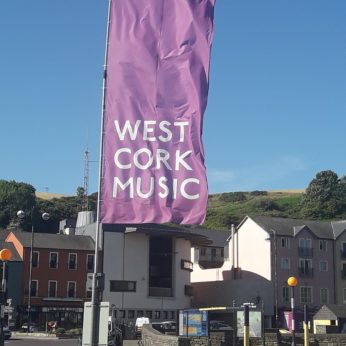Composer: Joseph Haydn (b. 1732 - d. 1809)
Performance date: 30/06/2010
Venue: Bantry Library
Composition Year: 1790
Duration: 00:17:40
Recording Engineer: Anton Timoney, RTÉ lyric fm
Instrumentation: vn, va, vc, pf
Instrumentation Category:String Quartet
Artists:
Chiaroscuro Quartet (Alina Ibragimova, Pablo Hernán Benedí [violins], Emilie Hörnlund [viola], Claire Thirion [cello]) -
[quartet]

Well here I sit in my wilderness – forsaken like a poor waif –
almost without human company – sad – full of memories of past glorious days…and
who knows when those days will return again. Those wonderful parties – where
the whole circle is one heart, one soul – all the beautiful musical evenings…for
three days I did not know if I was Kapellmeister or Kapell-servant. So wrote Haydn to a friend in February 1790, comparing the quality
of life in Esterhazy with the pleasures of his few weeks each year in Vienna.
Before that year ended his life was to be transformed, Prince Nicolous
Esterhazy died and his son Anton immediately dismissed the musical
establishment, retaining Haydn on reduced salary and free to seek work
elsewhere.
At the same time the
violinist-impresario Salomon was touring Europe looking for musical talent for
his London concert season. Despite Haydn’s isolation in Esterhazy his fame and
his scores had travelled far and wide and the English in particular were
desperate to hear him in person. One newspaper had proposed a drastic solution: Haydn is content to live immured in
a place little better than a dungeon, subject to the domineering spirit of a
petty Lord and the clamorous temper of a scolding wife. Would it not be an
achievement equal to a pilgrimage for some aspiring youths to rescue him from
his fortune and transplant him to Great Britain, the country for whom his music
seems to be made. One hopes
that Prince Nicolaus did not read the London papers.
So when Salomon heard Haydn was freed
from Esterhazy, he raced to Vienna and dramatically announced himself to Haydn: I am Salomom from London and have
come to fetch you. Tomorrow we will conclude an accord. The next day Haydn accepted an
enormous fee to write six symphonies, an opera and twenty smaller works and by
New Year’s Day he was in England – amongst the smaller works we would find the
set of six quartets Op.64, written in that fateful autumn, and premiered in
London the next year.
Haydn wrote well over sixty string
quartets so the custom of giving some of them nicknames does help us find our
way through so many scores. Some of the names have little bearing on the music
but the reason for calling this evening’s quartet the Lark is almost
immediately self-evident – the unforgettable melody from the first violin is clearly the lark’s song soaring out
above the earthbound march of the three lower instruments. This glorious song
and its earthbound opposite reappear throughout the movement making us believe
that perhaps we too can fly. The Adagio
cantabile is an unearthly
meditation, glowing with its intensity. Earthiness reappears in the witty
little minuet and its miniature trio. Haydn dedicated this quartet to his
friend and colleague Johann Tost and clearly he was confident in the quality of
his musicians as this moto perpetuo finale is a live-wire showpiece for a
quartet at the top of its game.
Copyright © 2025 West Cork Music. All rights reserved.
Designed and developed by Matrix Internet